|
|
|
Sort Order |
|
|
|
Items / Page
|
|
|
|
|
|
|
| Srl | Item |
| 1 |
ID:
074068
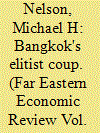

|
|
|
| 2 |
ID:
132536
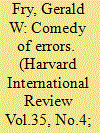

|
|
|
|
|
| Publication |
2014.
|
| Summary/Abstract |
Political crises are nothing new for Thailand. Since becoming a constitutional monarchy in 1932, the country has faced numerous political crises, including a 1973 student revolution to overthrow a military dictatorship, the storming of Thammasat University and the installation of an extremely right-wing government in 1976, and the people power victory over General Suchinda in 1992. In September 2006, a military coup deposed the former prime minister, Dr. Thaksin Shinawatra. In retaliation against the coup, Thaksin supporters in 2006 formed the United Front for Democracy against Dictatorship (UDD), a political pressure group whose supporters are commonly called Red Shirts.
|
|
|
|
|
|
|
|
|
|
|
|
|
|
|
|
| 3 |
ID:
069871
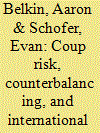

|
|
|
|
|
| Publication |
2005.
|
| Summary/Abstract |
Contrary to the literature on rallies-around-the-flag, this article argues that, in some circumstances, leaders may use international conflict to promote domestic divisiveness. More specifically, the threat of a military coup generally prompts leaders to divide their militaries (a practice known as counterbalancing), and even to engage in international conflict to ensure that various branches of their own armed forces remain distrustful of one another. Two empirical tests of these claims are offered: a large-N statistical analysis that examines whether coup risk leads to counterbalancing, and whether counterbalanced nations engage in more low-level military conflict (controlling for other causes of conflict); and a case study of Georgia shortly after the dissolution of the Soviet Union. Both empirical studies support the arguments advanced by the authors.
|
|
|
|
|
|
|
|
|
|
|
|
|
|
|
|
| 4 |
ID:
073567


|
|
|
| 5 |
ID:
132255
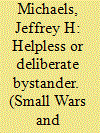

|
|
|
|
|
| Publication |
2014.
|
| Summary/Abstract |
The USA's role in fomenting and responding to military coups remains an understudied and politically contentious subject despite it being a recurring foreign policy problem exemplified most recently in both Egypt and Mali. To the extent this topic has been addressed in any depth by scholars, it is mainly limited to an examination of a small number of coups that occurred during the Cold War that the CIA was accused of sponsoring. However, this emphasis on well-known cases to the exclusion of lesser-known cases has resulted in a biased view of omnipotent US power. This limitation is reflected in the case of South Vietnam, in which the focus has been placed on the 1963 coup that overthrew President Ngo Dinh Diem, whereas the numerous other coups that occurred have received little or no attention. In this article, a more inclusive approach will be taken in which US policy will be examined with respect to all of the main coups and coup attempts that occurred during the period 1954-1975.
|
|
|
|
|
|
|
|
|
|
|
|
|
|
|
|
| 6 |
ID:
074070


|
|
|
| 7 |
ID:
184684
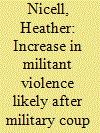

|
|
|
| 8 |
ID:
072838
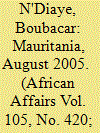

|
|
|
|
|
| Publication |
2006.
|
| Summary/Abstract |
A military coup abruptly ended Ould Taya's authoritarian regime in Mauritania, one of the longest-running regimes in West Africa. The bloodless coup broke a dangerous political impasse and stopped what seemed to be a slide towards breakdown and violence. Using the democratization literature, this article explains its root causes and evaluates the prospects for the establishment of a genuine democracy after two decades of a repressive military and then quasi-military regime. It argues that several variables combined to seal the regime's fate. These are essentially the deeply flawed, tribally based, make-believe democracy, Ould Taya's own troubled personality, and finally, the security apparatus's withdrawal of its backing. The article also argues that the new military junta's first decisions appear encouraging enough but that its determination to keep a tight control over the transition process and avoid the fundamental aspects of Mauritania's malaise may jeopardize genuine long-term democratization.
|
|
|
|
|
|
|
|
|
|
|
|
|
|
|
|
| 9 |
ID:
036729


|
|
|
|
|
| Publication |
New Delhi, Lancer International, 1986.
|
| Description |
241p.
|
|
|
|
|
|
|
|
|
|
|
|
Copies: C:1/I:0,R:0,Q:0
Circulation
| Accession# | Call# | Current Location | Status | Policy | Location |
| 026412 | 355.61/CHI 026412 | Main | On Shelf | General | |
|
|
|
|
| 10 |
ID:
036730


|
|
|
|
|
| Publication |
New Delhi, Lancer International, 1986.
|
| Description |
241p.
|
|
|
|
|
|
|
|
|
|
|
|
Copies: C:1/I:0,R:0,Q:0
Circulation
| Accession# | Call# | Current Location | Status | Policy | Location |
| 026205 | 355.61/CHI 026205 | Main | On Shelf | General | |
|
|
|
|
| 11 |
ID:
015698


|
|
|
|
|
| Publication |
July-Sept 1992.
|
| Description |
253-278
|
|
|
|
|
|
|
|
|
|
|
|
|
|
|
|
| 12 |
ID:
175414


|
|
|
|
|
| Summary/Abstract |
Robert Mugabe resigned as Zimbabwe’s president in November 2017, following a military action called Operation Restore Legacy. This article examines the motivations and dynamics of Operation Restore Legacy, which it characterizes as a coup by military generals that had significant commonalities with historical coups in Africa. This characterization, which is informed by the accounts of coup participants and a reading of the literature, challenges interpretations of the coup as ‘a non-coup-coup’, ‘very Zimbabwean’, or ‘special’. The article argues that the coup was a vote of no confidence in Mugabe’s leadership, which succeeded because soldiers from Zimbabwe’s 1970s independence war subscribed to the coup’s stated ideal to restore liberation struggle principles in the ruling Zimbabwe African National Union Patriotic Front party as well as party members who had been sidelined. Liberation war veterans held decisive army and air force command posts when the coup occurred. The article’s emphasis on liberation struggle principles as a crucial determinant of the coup’s success is a counterpoint to game theoretic approaches to coup dynamics that disregard political beliefs as a consequential factor in the realization of coups. In respect of motivations, the article advances interrelating motives and contends that the coup’s catalyst was Mugabe’s refusal to meet his generals on 13 November 2017, for vital talks on widening differences between both parties. Sealing off dialogue catalyzed the coup.
|
|
|
|
|
|
|
|
|
|
|
|
|
|
|
|
| 13 |
ID:
116304
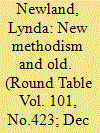

|
|
|
|
|
| Publication |
2012.
|
| Summary/Abstract |
Although Methodism has remained the dominant form of Christianity in Fiji, Methodist beliefs have been contested by a proliferation of Pentecostal/evangelical churches, but never more directly than by a new form of Methodism which flourished in the years up to 2009. This new church was called the New Methodist Church and, for a period in 2008 and 2009, the Fiji police forces were strongly encouraged to participate and finally to convert to it. This article is part of ongoing research that traces the alliances and challenges between Christianity and the state in Fiji.
|
|
|
|
|
|
|
|
|
|
|
|
|
|
|
|
| 14 |
ID:
188688


|
|
|
|
|
| Summary/Abstract |
Authoritarian regimes repress to prevent mass resistance to their rule. In doing so, regimes’ security forces require information about the dissidents who mobilize such resistance. Political competition, which fuels partisan rivalries, offers one solution to this problem by motivating civilians to provide needed information to security forces. Yet civilians share information about any political opponents, not just dissidents, which creates a challenge for regimes that want to target dissidents. Drawing on novel archival data from the immediate aftermath of the 1973 coup that brought Augusto Pinochet to power in Chile, a period that included civilian collaboration with repression, this article presents evidence that close pre-coup political competition is associated with more frequent repression and more targeting of non-dissidents. The author uses pre-coup democratic elections to measure political competition and addresses the challenge of estimating political preferences unaffected by repression. Qualitative evidence and further quantitative tests probe implications of the partisan rivalry mechanism and account for alternative explanations.
|
|
|
|
|
|
|
|
|
|
|
|
|
|
|
|
| 15 |
ID:
116303


|
|
|
|
|
| Publication |
2012.
|
| Summary/Abstract |
The indigenous Fijian conviction of entitlement to political power was encouraged by their privileged position in the colonial state and their marginalisation in the modern economy. The development of a cohesive nation state has been impeded by ongoing conflict between two political imperatives: indigenous nationalism and the need to shape a system of political representation and government accommodating the interests of the non-indigenous citizens, primarily the Indians, who together number over 40% of the population. This paper traces the course of that conflict from the commencement of decolonisation in the early 1960s to the political instability arising from strengthened ethno-nationalism and military intervention since 1987.
|
|
|
|
|
|
|
|
|
|
|
|
|
|
|
|
| 16 |
ID:
073558


|
|
|
| 17 |
ID:
190799


|
|
|
|
|
| Summary/Abstract |
This paper discusses how different groups within Myanmar’s population respond to multiple crises caused by the 2021 military coup, the economic and social consequences of multiple waves of Covid-19 and increasing global food and fuel prices. It is based on monthly observation reports (MOR) by local researchers to focus on the range of actions taken by Myanmar’s silent accommodating majority. Contrary to conventional studies that treat “loyalty” and “passive resistance” as separate categories of individual or collective responses to government failures, this paper introduces “accommodation” as a strategy to reflect actions by those who have engaged in both compliance and passive resistance to deal with the military dictatorship in Myanmar. Those who practice accommodation strategies prioritize safety-first approaches that avoid open resistance to the military regime while simultaneously challenging its claim to legitimacy. Some of the strategies that undermine the military regime’s claim to legitimacy, however, such as the civil disobedience movement in education and healthcare, further deprive the state of the resource to serve the needs of the general population and thus have detrimental and long-term impacts on individuals who use these.
|
|
|
|
|
|
|
|
|
|
|
|
|
|
|
|
| 18 |
ID:
132114
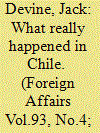

|
|
|
|
|
| Publication |
2014.
|
| Summary/Abstract |
On September 9, 1973, I was eating lunch at Da Carla, an Italian restaurant in Santiago, Chile, when a colleague joined my table and whispered in my ear: "Call home immediately; it's urgent." At the time, I was serving as a clandestine CIA officer. Chile was my first overseas assignment, and for an eager young spymaster, it was a plum job. Rumors of a military coup against the socialist Chilean president, Salvador Allende, had been swirling for months. There had already been one attempt. Allende's opponents were taking to the streets. Labor strikes and economic disarray made basic necessities difficult to find. Occasionally, bombs rocked the capital. The whole country seemed exhausted and tense. In other words, it was exactly the kind of place that every newly minted CIA operative wants to be.
|
|
|
|
|
|
|
|
|
|
|
|
|
|
|
|
|
|
|
|
|